Hypnos: God Of Sleep Who Owns Much Of Our Lives In Greek Mythology
A. Sutherland - AncientPages.com - In "Theogony," a Greek poet Hesiod who likely lived around 700 BC, tells about Hypnos, the god of sleep, and his twin brother, Thanatos, the god of death, who the Greeks occasionally saw as a harbinger of a peaceful death. Their parents were Nyx, the goddess of the night, and Erebus, the god of darkness.
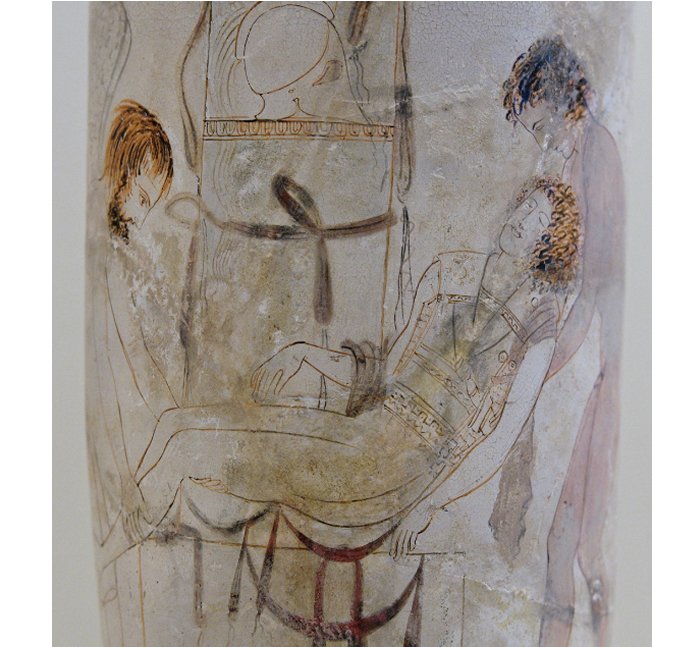 Hypnos and Thanatos carrying the body of Sarpedon from the battlefield of Troy; detail from an Attic white-ground lekythos, ca. 440 BC. source
Hypnos and Thanatos carrying the body of Sarpedon from the battlefield of Troy; detail from an Attic white-ground lekythos, ca. 440 BC. source
The two divine brothers work in good cooperation, and together, they successfully help humans avoid unnecessary suffering and die peacefully during sleep. Hypnos masters people's dreams and owns half of their lives, watching over men's dreams and above all over the gods' dreaming.
Homeric sleep – pleasant but sometimes dangerous
In the "Iliad," Homeric sleep is a good, sweet, and pleasant thing. It brings rest to the exhausted body and brain and helps to forget sorrows.
But sometimes, sleep can also be dangerous when it occurs at the wrong time and place, especially when action is urgently needed. Patroclus, the friend of Achilles, puts on his armor and commands the Myrmidons in a battle against the Trojans. Sadly, he is slain by Hector, one of King Priam's sons. Then, the ghost of Patroclus reproaches Achilles for forgetting his duties towards his dead friend.
In "The Iliad," Homer (c. 800 -c. 701 BC) wrote that to prevent Zeus from joining the Trojan War, Hypnos put Zeus to sleep. Strongly influenced by the goddess Hera's power of persuasion, he did what she wanted. Hera and Thanatos could then bring the body of Sarpedon back to his native Lydia. Sarpedon was a Lycian prince and a hero in the Trojan War, killed before Troy's gates in the battle against the Greeks.
Hypnos successfully outmaneuvered Zeus, and it certainly was a desirable deed, but soon, the father of the gods woke up and knew that he was fooled. He could not even punish Hypnos because "the guilty" already arranged his escape to avoid Zeus' anger and hid in his mother's underworld cave.
Hypnos was usually depicted as a young winged man or boy holding poppy flowers in his hand (or in his hair) and an opium horn.
Among other elements related to Hypnos and his work is an opium horn, which allows him to induce sleep in people.
Hypnos was the God of sleep in Greek mythology. Credit: Adobe Stock - matiasdelcarmine
Tradition has it that he lives in a big cave palace in the underworld. Around his home entrance, grow beautiful poppies and other sleep-inducing plants. Around the cave flows the river Lethe ("Forgetfulness"), one of Hades' underworld's five rivers. Homer's version, the master of people's and gods' dreams, lives on Lemnos, his private dream-island.
He never sets his eyes on the sun, and the night is his kingdom.
The Greeks believed that the consequence of the Hypnos' appearance was the spreading of sleep-weariness, after which came the time of peaceful sleep. Everybody respected Hypnos, and none of the deities (much less human beings) could resist his great power.
Selene, Endymion and Hypnos
An important role plays Hypnos in the tale of Selene and Endymion.
In myth, Endymion is a shepherd who admires the night sky and the moon goddess Selene. Selene falls in love with a handsome boy and often watches over him while he sleeps.
Endymion wanted her love to stay that way forever, but there were problems because Zeus did not want to make Endymion immortal, so Hypnos gave him the power to sleep with his eyes open. From now on, Endymion could constantly watch Selene moving across the night sky.
There was also another reason why Hypnos agreed to give him eternal sleep. The god himself could forever look into Endymion's beautiful eyes and handsome face, and so could Selene.
Legend says that Hypnos travels far and wide across the land and sea with fantastic speed and touches the person's forehead in question with a branch or drops on the eyes, the liquid he carries in his horn of opium.
Three sons of Hypnos
It is believed that he had many sons (the Oneroi), but only three of them are considered as gods of dreams: the first is Morpheus, the assistant of his father Hypnos), delivers dreams to all, but with extreme caution applying the dreams of kings and heroes.
Phobetor appears in dreams "in the form of beast or bird or the long serpent" and delivers terrible dreams, can be a source of phobia), and Phantasos is responsible for surreal dreams or fantasy.
All of them still influence our dreams that can be frightening or pleasant, or good and bad. Humans dream, and so do animals because Hypnos and his sons own much of our lives and are with us forever.
Written by – A. Sutherland - AncientPages.com Senior Staff Writer
Copyright © AncientPages.com All rights reserved. This material may not be published, broadcast, rewritten or redistributed in whole or part without the express written permission of AncientPages.com
Expand for referencesReferences:
STAFFORD, EMMA J. "ASPECTS OF SLEEP IN HELLENISTIC SCULPTURE" Bulletin of the Institute of Classical Studies, no. 38 (1991): 105-20.
Cotterell, Arthur. A Dictionary of World
More From Ancient Pages
-
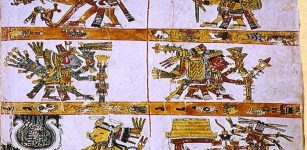 Codex Borgia: Pre-Columbian Mexican Manuscript Of Great Importance
Ancient Traditions And Customs | Sep 7, 2016
Codex Borgia: Pre-Columbian Mexican Manuscript Of Great Importance
Ancient Traditions And Customs | Sep 7, 2016 -
 Code Of Chivalry: ‘Knightly’ Behavior, Courageous Medieval Knights, Warriors And Superior Men
Featured Stories | Jun 5, 2016
Code Of Chivalry: ‘Knightly’ Behavior, Courageous Medieval Knights, Warriors And Superior Men
Featured Stories | Jun 5, 2016 -
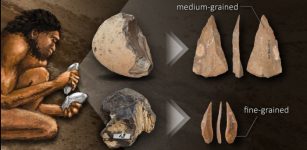 Paleolithic Humans May Have Understood The Properties Of Rocks For Making Stone Tools
Archaeology | Dec 2, 2023
Paleolithic Humans May Have Understood The Properties Of Rocks For Making Stone Tools
Archaeology | Dec 2, 2023 -
 Hermes – Divine Trickster, Psychopomp, Patron Of Merchants And Thieves In Greek Mythology
Featured Stories | Jan 15, 2019
Hermes – Divine Trickster, Psychopomp, Patron Of Merchants And Thieves In Greek Mythology
Featured Stories | Jan 15, 2019 -
 Unexplained Visions Of Airmen – Strange Presence And Disturbances – Part 1
Featured Stories | Feb 6, 2020
Unexplained Visions Of Airmen – Strange Presence And Disturbances – Part 1
Featured Stories | Feb 6, 2020 -
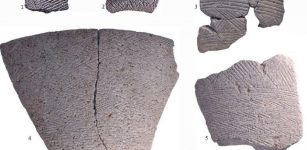 Mysterious Ancient ‘Triangle Code’ And Curious Markings Discovered On Vessels In Israel Reveal Something Interesting
Archaeology | Feb 11, 2019
Mysterious Ancient ‘Triangle Code’ And Curious Markings Discovered On Vessels In Israel Reveal Something Interesting
Archaeology | Feb 11, 2019 -
 How Ancient Scientists Calculated The Circumference Of The Earth
Ancient History Facts | May 1, 2017
How Ancient Scientists Calculated The Circumference Of The Earth
Ancient History Facts | May 1, 2017 -
 Pandavleni Caves: Skillfully Carved Rocky Realms Decorated With Sculptures And Inscriptions In Brahmi Script
Featured Stories | Aug 1, 2016
Pandavleni Caves: Skillfully Carved Rocky Realms Decorated With Sculptures And Inscriptions In Brahmi Script
Featured Stories | Aug 1, 2016 -
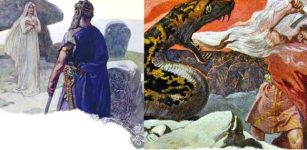 Völuspá – Norse Prophecy Of The Völva, A Feared Shaman By The Vikings
Featured Stories | Mar 26, 2018
Völuspá – Norse Prophecy Of The Völva, A Feared Shaman By The Vikings
Featured Stories | Mar 26, 2018 -
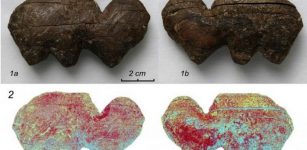 Ancient Mammoth Ivory Carving Technology Of Master Craftsmen – Reconstructed
Archaeology | Aug 27, 2020
Ancient Mammoth Ivory Carving Technology Of Master Craftsmen – Reconstructed
Archaeology | Aug 27, 2020 -
 Excavations of the Aşıklı Mound, Cappadocia , Turkey
Civilizations | Aug 22, 2015
Excavations of the Aşıklı Mound, Cappadocia , Turkey
Civilizations | Aug 22, 2015 -
 Why Was The Dmanisis Gora Fortress Community So Resilient In The Transition From The Bronze To Iron Age
Archaeology | Jun 5, 2023
Why Was The Dmanisis Gora Fortress Community So Resilient In The Transition From The Bronze To Iron Age
Archaeology | Jun 5, 2023 -
 2,000-Year-Old Fountain In Kibyra, The City Of Gladiators Flows Again
Archaeology | Jan 3, 2023
2,000-Year-Old Fountain In Kibyra, The City Of Gladiators Flows Again
Archaeology | Jan 3, 2023 -
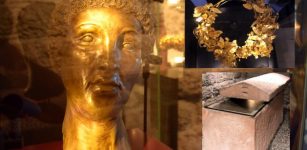 Carian Princess’ Tomb, Golden Artifacts – Now On Display In Renovated Hall Of Bodrum Castle
Artifacts | Aug 27, 2020
Carian Princess’ Tomb, Golden Artifacts – Now On Display In Renovated Hall Of Bodrum Castle
Artifacts | Aug 27, 2020 -
 Extremely Rare English Medieval Shipwreck With Fascinating Cargo Discovered In Poole Bay, Dorset
Archaeology | Jul 23, 2022
Extremely Rare English Medieval Shipwreck With Fascinating Cargo Discovered In Poole Bay, Dorset
Archaeology | Jul 23, 2022 -
 On This Day In History: Aviator Amelia Earhart Was The First Woman To Cross The Atlantic By Air – On June 18, 1928
News | Jun 18, 2016
On This Day In History: Aviator Amelia Earhart Was The First Woman To Cross The Atlantic By Air – On June 18, 1928
News | Jun 18, 2016 -
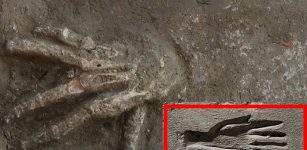 Mysterious Ancient Egyptian Severed Hands Practice Investigated By Scientists
Archaeology | Apr 1, 2023
Mysterious Ancient Egyptian Severed Hands Practice Investigated By Scientists
Archaeology | Apr 1, 2023 -
 Ancient Giants In Ecuador Were Killed By Fire From The Sky – Indian Legends Reveal
Ancient Mysteries | Dec 12, 2017
Ancient Giants In Ecuador Were Killed By Fire From The Sky – Indian Legends Reveal
Ancient Mysteries | Dec 12, 2017 -
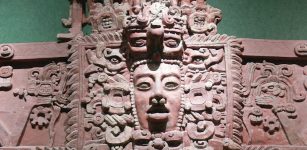 Ancient Maya Lessons On Surviving Drought – Examined By Scientists
Archaeology | Jan 5, 2022
Ancient Maya Lessons On Surviving Drought – Examined By Scientists
Archaeology | Jan 5, 2022 -
 More Than A Meteorite: New Clues About The Demise Of Dinosaurs
Paleontology | Dec 5, 2023
More Than A Meteorite: New Clues About The Demise Of Dinosaurs
Paleontology | Dec 5, 2023

